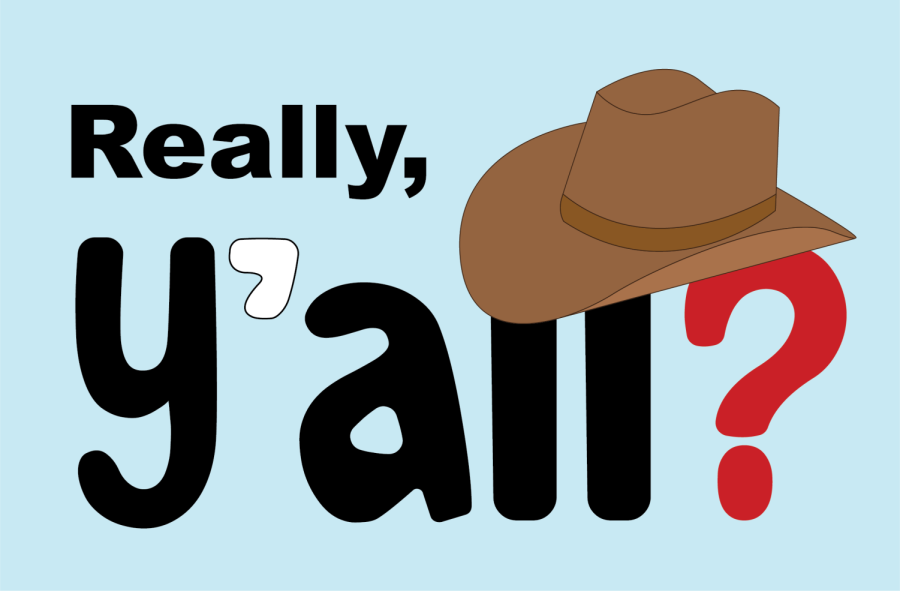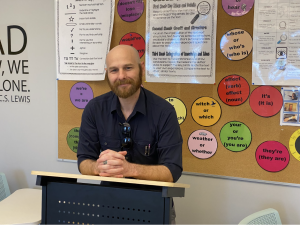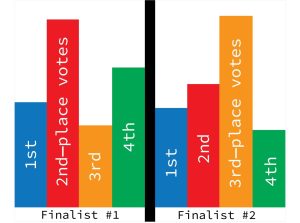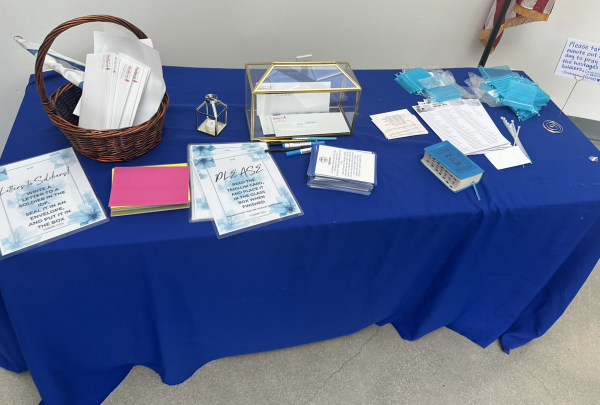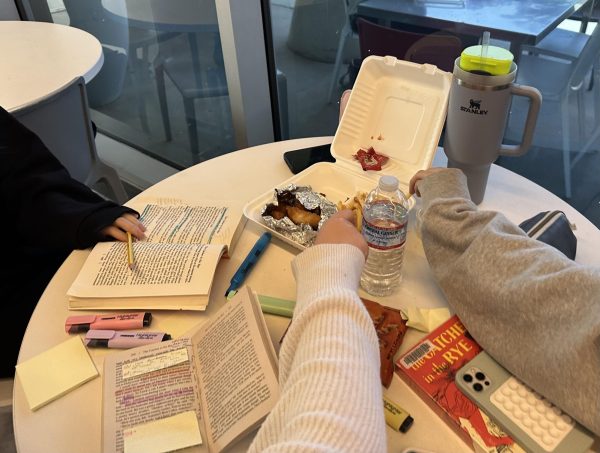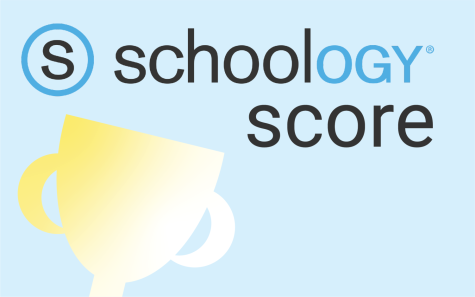Goofy, friendly or just clearly plural, a new word from the South catches on
Students and staff increasingly use the pronoun ‘y’all,’ a gender-free ‘term of endearment’
HISTORIC: Y’all has been in use since 1631, when British writer William Lisle introduced it in his novel ‘The Faire Æthiopian.’
y’all
[pronoun]
\ ˈyȯl \
variant of YOU-ALL
Merriam-Webster English Dictionary
Every word has a definition. Most words have connotations. Some have hidden meanings. But no word has quite the culture and lovingly goofy sensation that the word ‘y’all’ has– which may be why the Shalhevet community has fallen in love with it.
‘Y’all,’ a word that originated in the American South, seemed to take hold last year and was usually used for comedic purposes, not for any functional reason. Students may have been hesitant to use it because of its lack of elegance, but with every half-joking application, its stigma has slowly dissolved.
An informal survey of the Shalhevet community found that at this point, people like and are using the word for a variety of reasons. Some like the word because it solves a problem: the lack of a distinctively second-person plural pronoun in English. Others like it because of its quirky aura, which adds a little humor or informality to any sentence.
“You can use ‘y’all’ in a good way or a bad way,” said senior Josh Askari, who said he enjoyed “y’all” for its flexibility. “It’s a go-to word in any situation.”
Fellow senior Gabrielle Urman likes using it to convey resentful or pessimistic emotions.
“I like using the word ‘y’all’ in negative situations,” Gabrielle said. “Like it still makes sense to use when I’m angry or yelling at someone.”
Ms. Priyanka Singh, Associate Director of College Counseling and Academic Guidance, has been the leading user of ‘y’all’ on Schoology since March. Her reason, she explained, is that the word has no gender – especially in contrast with “you guys,” its more common alternative, the word “guys” normally referring to males.
“I feel that ‘you guys’ is a very gendered terminology,” Ms. Singh said. “To me, ‘y’all’ is all. It’s a way to be more inclusive, while still being informal and bringing people into what I’m saying.”
Ms. Singh is known for her tendency to begin her Schoology posts with, “Hey y’all!”– a noticeable departure from the usual, “REMINDER,” or “ATTENTION.”
She says this is deliberate. At Shalhevet, “y’all” has also become a term of endearment.
“In terms of community, ‘y’all’ conveys a sense of warmth that isn’t found in other words,” Ms. Singh said.
Ever since “ye” faded out of the American lexicon a couple hundred years ago, only three replacements for the second-person plural pronoun have come to light: “y’all,” “you all” and “you guys.”
“You all” is phonetically uncomfortable because of the back-to-back vowels. And while “you guys” has become widespread enough to fit into conversation seamlessly, its presumed maleness – “guys” are male – makes it less than precise.
“Y’all” does not have either of these problems. Its deficiency is that it doesn’t sound enough like a real word – it feels more like a slang term. Which in many situations, students say, makes it actually, well, better.
“Using ‘y’all’ adds some fun to any conversation,” said senior Jonathan Soroudi. “It’s a peaceful word that tends to make me and the person I’m talking to feel cheerful.”
However, “‘y’all” was first used, albeit differently, hundreds of years ago, according to David B. Parker, a professor who published an article about it on the History News Network.
Prof. Parker wrote that William Lisle, a 17th-century British writer who sat in the House of Commons, is credited with first using it, in 1631. In his novel, The Faire Æthiopian, he innovatively wrote:
The captive men of strength I gave to you,
The weaker sold; and this y’all know is true,
The free-borne women ransom’d, or set free
For pittie sake, the servile sort had yee.
Mr. Parker acknowledged that in this case and many like it, “y’all” was a contraction of “you” and “all” used merely used for the purpose of a poem and its rhythm, rather than in common language. Thus, Lisle likely didn’t intend to invent a revolutionary new term; he contracted two short words so that his poem would flow.
In the Western Hemisphere, “y’all” began as a colloquialism and its use became synonymous with Southern culture.
Junior Caroline Kboudi, a native Texan who moved to Los Angeles for high school, stopped using “y’all” when she moved to California and didn’t seem to miss it.
“When I came to Shalhevet, it was a part of my vocabulary,” Caroline said. “But I feel like as time went on and the more I’ve become accustomed to the culture in Los Angeles, I find myself saying it less.”
Los Angeles is somewhat known for its absurd phrases, such as “yeah, no yeah” (“yes, reluctantly) or “no, yeah no” (“no,” rudely). So Caroline didn’t expect a word like “y’all,” – which was part of the Southern jargon that she tried to leave behind – to become popular at Shalhevet.
“It’s a practical word that makes sense to use in conversation,” Caroline said. “But it’s funny to me that that kind of Southern culture is coming to Shalhevet.”
History teacher Dr. Keith Harris, who grew up in Alabama, said one key syntactical element of “y’all” has stayed local to the South, and has not migrated to the West.
“It’s a regional expression that is inherently plural,” Dr. Harris said, “but there’s a further plural that isn’t used here, that we use in the South.
“When you’re addressing everyone together, you’d say something like, ‘All y’all gonna find out what happens.’”
“Y’all,” he explained, is plural, but “all y’all” has the connotation of addressing a larger group of people, and the subtle difference in the phrases would be hard for an Angelino to pick up on – hence its not being used here.
Still, Caroline’s appreciation for the convenience of the word is a common theme among students.
“Y’all” is not only a lighthearted colloquialism, nor is it merely a contraction like any other, or just an exciting statement to attract attention — it’s all of those things and more.
Scholars have recognized this as well. In his book The Story of English in 100 Words, author David Crystal astutely summarized the reason for “y’all”s popularity. After explaining the origins, Mr. Crystal explained that “y’all” is used over “you” because of the good-natured feeling it carries.
“So, if you already exists in modern English, why use y’all? The two forms can be used for either singular or plural, so that can’t be the reason. Is there a difference between saying I hope to see y’all and I hope to see you? Most people find y’all ‘warmer’ — a sign of familiarity, friendliness, informality or rapport.”
At Shalhevet, for both speaker and listener, being called “y’all” seems warmer than “you guys,” or “everyone,” and people say it’s more fun to use.
So much more fun, in fact, that English speakers should arguably be thankful that there isn’t any actual second-person-specific plural pronoun.

Avi Litvak, 12th grade, began his involvement with the Boiling Point his freshman year as a sports broadcaster and became a staff writer his sophomore year. He specialized in restaurant reviews and sports coverage, and was recognized by School Newspapers Online in Best of SNO in 2021. Aside from journalism, Avi is the captain of the Model Congress and baseball teams, as well as president of the Geography Club and the Tranquility Society. He also spends time entertaining his social media following with urban photography in Los Angeles. This year, Avi is serving as Opinion Editor.

